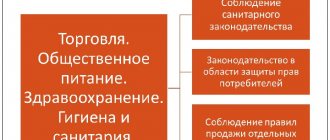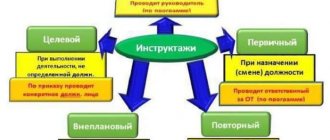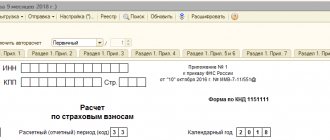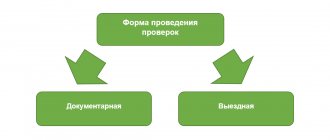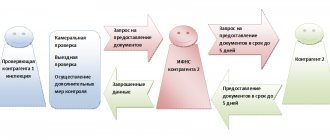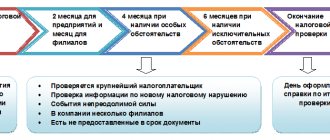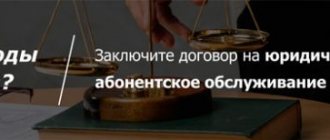Hello! Today we will discuss what an inspection by the labor inspectorate is, what violations it reveals, and what the employer faces if he breaks the law. An audit from the tax office is the second most popular after the tax audit.
If you have at least one hired employee, be prepared to be checked for compliance with labor laws and labor safety standards. But, as they say, forewarned is forearmed. Undesirable consequences can be avoided if you know when, how they will check, and how you can prepare.
What are the types of labor inspections? Grounds for GIT inspections
GIT inspection activities can be scheduled or unscheduled.
The first of them are preventive in nature and do not depend on the actions of the employer and third parties. Previously, enterprises were inspected by inspectors no more than once every 3 years - according to the general norm of Part 2 of Art. 9 of the Law “On the Protection of Rights...” dated December 26, 2008 No. 294-FZ (hereinafter referred to as Law 294-FZ). Nowadays, the frequency of planned HIT monitoring depends on the risk category assigned to the employer. Thus, inspections of employers with a high category are carried out no more than once every 2 years, and those with a low category are not carried out at all (see paragraphs 17–24 of the Regulations on Labor Supervision, approved by Decree of the Government of the Russian Federation of September 1, 2012 No. 875).
The expiration of the specified periods from the end of the last scheduled control or registration of the enterprise in itself is already grounds for a new inspection.
Special grounds have been established for unscheduled control (Part 7, Article 360 of the Labor Code of the Russian Federation):
1. Expiration of the period for eliminating violations established in the order previously issued to the employer.
2. Receipt to the inspection:
- information about violations at the enterprise that resulted in a threat to the life and health of people, non-payment of wages or payment below the minimum wage;
- information about labor relations not properly formalized;
- complaints about violation of labor rights or applications for inspection of labor protection conditions from an employee.
3. Order of the head of the inspection, issued in accordance with the instructions of the President, the Government or the requirements of the prosecutor's office.
Documents for a scheduled or unscheduled inspection by the labor inspectorate
Order No. 655 approved the following topics for verification:
- General (No. 1–37, 100): checking the hiring procedure (list of questions No. 1), the content of employment contracts (list No. 2), etc. Most employers fall under the parameters of verification on these topics.
- Industry (No. 38–107): labor protection in housing and communal services (No. 38), etc. These lists are mainly devoted to labor protection issues for various types of work. The exception is list No. 107, which contains questions on guarantees for health workers. It can be assumed that the list will be supplemented, since there are obvious gaps for some types of work and guarantees. For example, to check compliance with guarantees for education workers, it is also possible to develop a separate checklist.
When preparing for the inspection, it is necessary to take into account that for each of the questions you will need to submit a document confirming the fulfillment of the requirement. Let's look at examples.
Checklist No. 1: hiring
If you focus strictly on the questions on the list, you need to submit:
- Employment contracts (you will learn about their content and basic requirements from the article on the website Employment contract with a probationary period according to the Labor Code of the Russian Federation). The contract with the manager falls into this category (see the article Employment contract with the general director (sample)). There is no information on whether it is necessary to submit documents on the extension of powers, but it is also advisable to prepare them (for details, see the material How to correctly draw up personnel documents when extending the powers of the general director).
- LNA, which provides for medical examinations (if any), an agreement with a medical organization, a logbook for issuing referrals, and other documents confirming the completion of medical examinations (see more in the article Periodic medical examination of enterprise employees).
- Civil contracts (CLA).
- Orders for employment.
- Sheets (magazines) of familiarization with LNA (see the article Sheet of familiarization with LNA - sample).
One of the most difficult topics to check is salary, issues of its calculation and payment.
What documents do the labor inspectorate need to check the accrual and payment of wages (checklists No. 7, 17)
To check according to checklist No. 7 you need to prepare:
- LNA on the remuneration system: regulations on remuneration, regulations on bonuses, etc. (for details, see the article What are the types of salaries and forms of remuneration, Is a bonus a component of the salary?).
- Documents on payslips: approval order, issue log (see article When is a payslip issued?).
- Documents on recording working hours to establish overtime (see the article How to draw up a schedule for recording the working hours of employees?).
- Documents for the payment of wages: employment contracts, salary statements (payroll according to form T-51, approved by the resolution of the State Statistics Committee of the Russian Federation “On approval of unified forms...” dated 01/05/2004 No. 1, payroll according to form T-53, payslip according to Form T-49 and other supporting documents). Read more about the confirmed circumstances in the article The procedure for paying wages under the Labor Code.
- Orders on deductions and attachments to them (see the article What types of deductions exist from salaries?).
In addition, it is necessary to submit documents confirming additional payments in favor of employees due on various grounds (see more in the article Salary supplements - additional payments and compensations).
Unscheduled inspection
An unscheduled inspection by the labor inspectorate is carried out on the grounds listed in Art. 360 Labor Code of the Russian Federation. The list of grounds is closed, but can be expanded (see the message about the bill on our website): employee complaints, messages, etc.
The limits of unscheduled inspection are not regulated by law. Its purpose is to verify the arguments and facts presented in the received document. To accomplish this task, the inspection can be carried out in documentary or on-site form.
Scheduled inspection of GIT - what do inspectors check?
The purpose of scheduled inspections of any of the regulatory authorities is to find out whether business entities comply with the mandatory requirements of the law in a particular area. Accordingly, the subject of planned control of State Labor Inspectorate is compliance by employers with labor and labor protection legislation.
Also, as part of planned control, compliance with the mandatory requirements of the information specified in notifications of the commencement of certain types of activities is checked.
Let us remind you that supervisory authorities must be notified of the start of activities in some areas. Thus, Rostrud is notified of such types of activities as care with accommodation and social services without accommodation (clause 5.1 of the Rules, approved by Decree of the Government of the Russian Federation of July 16, 2009 No. 584).
Methodological recommendations (approved by order of Rostrud dated October 28, 2010 No. 455) distinguish between comprehensive and thematic inspections (subclause 2.6, clause 2). The first are aimed at checking compliance with labor legislation in general (for the main institutions of labor law).
Thematic inspections of the labor inspectorate concern individual labor law institutions, for example:
- proper registration of labor relations;
- occupational safety training;
- timeliness and completeness of payment;
- provision of compensation and guarantees, etc.
In practice, State Labor Inspectorate plans indicate in the column “Subject of inspection” a standard phrase about checking compliance with labor laws. Therefore, it is impossible to find out in advance what the labor inspectorate will check during the inspection.
Checking compliance with labor legislation on wages
“HR service and personnel management of the enterprise”, 2007, N 10
Checking compliance with labor legislation on wages
It is known that the most controversial labor inspections are related to wage violations. They occupy a leading position in the list of misconduct by employers. And since, according to the inspectors, there is no organization that fully complies with labor laws and does not make mistakes in maintaining personnel records, the doors of any company are open to labor inspectors. By the way, they are not the only ones who can come to you with a check. Who else can monitor compliance with labor laws in the organization? What are typical wage violations? What types of liability are provided for violators? Valentina Mitrofanova, a practicing consultant on the application of labor legislation, spoke about this at the seminar.
Who will check us
So, which government inspection bodies are interested in compliance with labor laws regarding wages in your organization:
1. Federal Labor Inspectorate (hereinafter referred to as FIT).
Almost every personnel worker primarily associates labor inspection with the word “inspection.” And we all know what powers she has.
Document fragment. Article 356 of the Labor Code of the Russian Federation
In accordance with the tasks assigned to it, the Federal Labor Inspectorate exercises the following main powers:
— carries out state supervision and control over employers’ compliance with labor legislation and other regulatory legal acts containing labor law norms, through inspections, surveys, issuing binding orders to eliminate violations, drawing up protocols on administrative offenses within the scope of authority, preparing other materials (documents) ) on bringing the perpetrators to justice in accordance with federal laws and other regulatory legal acts of the Russian Federation;
— analyzes the circumstances and causes of identified violations, takes measures to eliminate them and restore the violated labor rights of citizens (...);
— sends, in the prescribed manner, relevant information to federal executive authorities, executive authorities of constituent entities of the Russian Federation, local government bodies, law enforcement agencies and the courts;
— carries out supervision and control over compliance with the established procedure for investigating and recording industrial accidents;
— generalizes the practice of application, analyzes the causes of violations of labor legislation and other regulatory legal acts containing labor law norms, prepares appropriate proposals for their improvement (...).
At the end of the inspection, the labor inspector will draw up a report, and if violations are found, a protocol and will issue you an order. You will learn further about what typical errors in labor legislation regarding wages are identified by the FIT and what types of liability are provided for them.
2. Federal Tax Inspectorate.
The presence of tax officials in this list is not accidental. The fact is that labor inspectors interact with tax inspectors. And if, during an inspection by a labor inspector, violations of wages are found, then your organization may face a tax audit. Tax inspectors carry out wage audits mainly “on a tip” from Trudoviks. Now this issue is on the agenda, because tax officials are closely involved in shadow wages.
[email protected] dated May 30, 2007. In this document, tax officials set out publicly accessible criteria for self-assessment of risks for taxpayers, used in the process of selecting objects for conducting on-site tax audits, starting from 25 June 2007. Among the criteria the following is indicated: “5. Payment of average monthly wages per employee is below the average level for the type of economic activity in the constituent entity of the Russian Federation.” Information on the average monthly salary can be found on the Rosstat websites or in statistical collections prepared by statistical authorities. It turns out that one violation of wages can not only lead to various types of liability (depending on its frequency and severity), but also lead to an on-site tax audit. And the tax authorities will not miss the chance to check you.
By the way, keep in mind that a tax audit may be followed by a labor audit. Thus, the Ministry of the Russian Federation for Taxes and Duties in its Letter dated February 20, 2004 N 02-5-10/6 indicated: “... if the tax inspectorate believes that as a result of the actions of the employer, labor legislation is violated, then it must send the relevant information to the bodies exercising control over compliance with labor legislation.”
3. Social Insurance Fund of the Russian Federation.
Fund inspectors check the correctness of the expenditure of compulsory social insurance funds, as well as the accrual, payment and expenditure of compulsory social insurance funds against industrial accidents and occupational diseases. It can be especially painful now to check the registration of sick leave and the correctness of the calculation of temporary disability benefits.
The fact is that on January 1, 2007, Federal Law No. 255-FZ of December 29, 2006 came into force, which changed the procedure for assigning and paying sick leave. Naturally, in order to carry out inspections competently, Foundation inspectors had to first undergo appropriate training. This took time away from completing the annual inspection plan. The period of active inspections actually began in March. This means that right now, by the end of the year, we can predict that an inspector from the Foundation will come to visit.
4. Prosecutor's office.
It turns out that even prosecutors can check your integrity regarding remuneration issues. The prosecutor's office, among other things, must monitor the observance of human and civil rights and freedoms by the heads of commercial and non-profit organizations. The reason for conducting a labor audit by the prosecutor's office may be a complaint from an employee of your organization. According to Art. 10 of Federal Law No. 2202-1 of January 17, 1992 (hereinafter referred to as Law No. 2202-1), the prosecutor’s office allows statements, complaints and other appeals containing information about violations of laws.
When the prosecutor comes to check you, then in accordance with Art. 6 of Law N 2202-1, you will be required to provide him free of charge with statistical and other information, certificates, documents and copies thereof necessary during the inspection. There is no need to be intimidated by the name of the inspection body - simply the labor inspection will be carried out by prosecutors.
Document fragment. Article 27 of the Federal Law of January 17, 1992 N 2202-1
Typical mistakes employers make when paying wages
According to statistics Art. 136 “Procedure, place and terms of payment of wages” of the Labor Code of the Russian Federation is the most violated by employers. The rating of errors in remuneration for this article is as follows:
1. Non-payment of vacation pay 3 days before the start of the vacation.
2. Failure to issue pay slips to employees (as well as the lack of a standard form of pay slip, failure to comply with the written form of this document, issuance of pay slip only once a month).
3. When paying wages through a bank, the employment contract does not stipulate who bears the costs for withdrawing money from an ATM, and the dates for paying wages through the bank are not specified in the employment agreement.
4. Advance payment instead of salary.
The fact is that in Art. 136 of the Labor Code of the Russian Federation does not contain the word “advance”. There are only two parts of the salary, which must be paid twice a month. Consequently, the salary should correspond to the time worked minus personal income tax, and not, for example, 10 or 20 percent of the salary, as a certain manager decided to establish in his organization. Of course, no one bothers you to pay half the salary for the first 2 weeks, but then if an employee is fired, you will not be able to keep the money previously paid from him.
By the way, monthly bonuses, incentives and compensation payments must also be paid twice a month! Incorrect wording in the Regulations on bonuses and remuneration will oblige you to even divide the annual bonus into 24 parts and pay it to the employee throughout the year. Or, for example, you will have to fork out to pay part of the monthly bonus to an employee who quits in the middle of the month.
How to avoid this? It is necessary to enter the correct wording into the text of the Regulations on bonuses or wages, as well as into employment contracts. For example, “...a monthly bonus, which is paid based on the results of the past calendar month,” “... an annual bonus, which is paid based on the results of the past calendar year,” “... a monthly bonus is paid if the employee has worked for a whole month.” In addition, employees who quit before the end of the year can be excluded from the number of bonuses, if such a condition is contained in a local regulatory act. Possible wording: “The annual bonus is paid to employees who have worked fully during the reporting calendar year.” With compensation payments, you can do this: “Compensation payment is paid if the employee submits supporting documents.”
In addition to the listed errors, there are others:
1. Non-payment of monetary compensation for delayed wages, vacation pay (in the amount of 1/300 of the refinancing rate for the Russian Federation <1> and in the amount of 1/200 of the refinancing rate for Moscow <2>).
———————————
<1> Article 236 of the Labor Code of the Russian Federation.
<2> Clause 2.21 of the Moscow tripartite agreement for 2007 between the Moscow Government, Moscow trade union associations and Moscow associations of industrialists and entrepreneurs (employers).
Do you know that receiving a salary once a month or being late with vacation pay is a reason for paying the employee monetary compensation? Imagine that a large organization has not paid its employees twice a month for several years. This means that the labor inspector will force her to pay compensation for all years to each employee. The calculations alone will take months! After all, you will need to take into account salary increases and constant changes in the refinancing rate. By the way, don’t forget about the penalty.
2. Failure to pay employees “a penny” for doing extra work.
In this case, there are several scenario options. They depend on the order in which the additional work is performed:
- fixed-term employment contract;
— additional payment (performance of duties, combination, expansion of service area);
- temporary transfer.
The performance of duties and combinations provide for 100 percent of the additional payment, since the employee is assigned the entire volume of work responsibilities. At the same time, expanding the service area makes it possible to pay only for a selected part of labor functions. However, this option is not suitable for all positions.
By the way, don’t expect that the labor inspector will believe you if you tell him that no one does the work of a chief accountant, timekeeper or, for example, a cleaner. In the latter case, you generally risk running into an inspection by Rostechnadzor, because you yourself said that no one cleans the office.
Types of liability
Suspension of activities
FIT can suspend the activities of an organization for violations of labor legislation for a period of up to 90 days (see paragraph 2 of article 3.12 of the Code of Administrative Offenses of the Russian Federation). Moreover, the Labor Code of the Russian Federation does not say for which violations. In practice this is done by:
— violations of labor protection (here suspension acts as a way to correct the violation. For example, employees work on computers, but the staff did not undergo a medical examination);
— violations of wages (suspension here is simply considered the most adequate type of punishment).
True, there are activities that cannot be suspended.
Document fragment. Article 142 of the Labor Code of the Russian Federation
...Suspension of work is not allowed:
— during periods of martial law, a state of emergency or special measures in accordance with the legislation on a state of emergency;
— in the bodies and organizations of the Armed Forces of the Russian Federation, other military, paramilitary and other formations and organizations in charge of ensuring the country’s defense and state security, emergency rescue, search and rescue, fire-fighting work, work to prevent or eliminate natural disasters and emergency situations , in law enforcement agencies;
- civil servants;
— in organizations directly servicing particularly hazardous types of production and equipment;
— employees whose job responsibilities include performing work directly related to ensuring the life of the population (energy supply, heating and heat supply, water supply, gas supply, communications, ambulance and emergency medical care stations).
What is suspension of activities for an organization? This is payment for forced downtime (2/3 of average earnings) <3> and, of course, economic losses. Losses are especially sensitive for seasonal work.
———————————
<3> Article 157 of the Labor Code of the Russian Federation.
Disqualification
More than 50 percent of violations for which this type of punishment is imposed are wage violations. When the inspector first finds a violation, he determines who is responsible and issues an order. If he finds a similar violation a second time within one year, you will face disqualification. Please note: a similar violation is a similar violation, not the same.
For example, for the first time the auditor discovered that you do not pay employees wages twice a month. And on the second visit it turned out that you do not have a standard form of pay slip. Would you say that the violations are different? No, this is the same article. 136 Labor Code of the Russian Federation. Then everything is simple: the consideration of the case in court takes at most half an hour. During this time, the inspector will explain to the judge the nature of the first and second violations, and the judge will make a decision.
In the court decision regarding the general director it will be written: “disqualification from the position of a managerial employee” (that is, you cannot hold any leadership positions at all), the chief accountant - “disqualification from the position of an accounting employee” (which means you cannot work not only as a chief, but also as a simple accountant ), the head of the personnel department - “disqualified from the position of a personnel employee.”
What are the consequences for an organization of hiring a disqualified specialist for a “prohibited” position? Everything that was signed by a disqualified employee - chief accountant, general director, head of a department - is invalid! Can you imagine what all your documents will cost? And if an organization is “too lazy” to check an employee in the Register of Disqualified Persons maintained by the Ministry of Internal Affairs, then the tax inspectorate will not consider it difficult to check your employees who are responsible for signing the primary documents.
Criminal liability
Criminal liability is established for non-payment of wages for more than two months if it was committed by the head of the organization out of selfish or personal interest (Article 145.1 of the Criminal Code of the Russian Federation). Only the general director faces such liability. He will be punished by a fine in the amount of up to one hundred twenty thousand rubles or in the amount of the wages or other income of the convicted person for a period of up to one year, or by deprivation of the right to hold certain positions or engage in certain activities for a term of up to five years, or by imprisonment for a term of up to two years. . If the delay in wages caused serious consequences, then the head of the organization will have to pay a fine in the amount of one hundred thousand to five hundred thousand rubles or in the amount of the wages or other income of the convicted person for a period of one to three years, or go to prison for a term of up to seven years with deprivation of the right to hold certain positions or engage in certain activities for a period of up to three years or without it.
* * *
Thus, failure to comply with the requirements of labor legislation may not only entail liability in the form of fines, disqualification and even imprisonment, but also a series of inspections by various regulatory authorities. But all this can sometimes be easily prevented without relying on chance.
E.M. Vasilyeva
Journal expert
Signed for seal
28.09.2007
Rostrud inspection plan in 2021 - where to get it?
Information about planned inspections of Rostrud is publicly available. Thus, inspections in the regions are required to publish the plan on their official Internet portals before December 1 of the year preceding the year of inspection.
In addition, information about inspections by the labor inspectorate is included in a single consolidated plan for inspections of entrepreneurs, formed by the Prosecutor General's Office of the Russian Federation. Using the corresponding service on the authority’s website, you can find out what scheduled inspections await the enterprise this year.
IMPORTANT! If an organization is not included in the plan, although the deadline for the next inspection has approached, they cannot do this within a year. An exhaustive list of reasons for changing the plan is enshrined in clause 41 of the Administrative Regulations, approved. by order of the Ministry of Labor dated October 30, 2012 No. 354n (hereinafter referred to as the Regulations).
The plan will help determine the expected month of the inspection, but not its specific date. GIT inspectors are required to notify the employer of the start of a scheduled inspection at least 3 working days before the control event by handing him an order for the inspection (Part 12 of Article 9 of Law 294-FZ).
Check results
Based on the results of the GIT inspection, a report is drawn up in 2 copies (for the GIT and for the organization being inspected). The form of the act was approved by the Ministry of Economic Development. The report is drawn up immediately after the end of the event, but the inspector has the right to issue this report within a maximum of 3 working days. If violations are identified, an order to eliminate them is attached to the report, indicating the deadline for execution. In cases where the violations are serious or the deadlines for fulfilling the issued order are violated, the GIT inspector draws up a protocol on the administrative violation and a resolution imposing an administrative penalty in the form of a fine. The employer has the right to immediately find out the results of the labor inspection, after which he has 15 days to submit his objections to a higher official of the State Labor Inspectorate or 10 days to appeal in court.
Types of documents of interest to inspectors during routine inspection
As a rule, the State Inspectorate requires the following list of documents during scheduled inspections:
1. Documents confirming the employment relationship:
- work books and inserts;
ATTENTION! If an employee has chosen the electronic option of maintaining a work record book, the employer is no longer responsible for the safety of the paper document. For details, see the material “How to switch to electronic work books.”
- employment contracts and additional agreements.
2. Book of registration of movement of work books.
3. Receipt and expense book for accounting of work book forms.
4. Order imposing duties on maintaining work records.
5. Mandatory local regulations:
- labor regulations;
- regulation on the protection of personal data;
- regulations establishing wages, additional payments, allowances and bonuses.
6. Collective agreement (if any).
7. Mandatory personnel documents:
- staffing schedule;
- time sheet;
- personal cards;
- job descriptions;
- vacation schedule;
- shift schedule.
8. Form of pay slip.
9. Medical books.
10. Personnel administrative documents and grounds for them (memos, statements, etc.)
11. Registration and accounting journals (sick leave, employment contracts, orders, industrial accidents, etc.).
12. Instructions and other documents on labor protection (the composition depends on the area of activity of the enterprise).
13. Documents related to wages (salary slips, memos, calculations, etc.).
14. Logbook of control activities.
Please note that most of the violations are related to the lack of any labor protection documents.
Boundaries of what is permitted
What do labor inspectors have the right to do, and what actions are beyond the scope of their job descriptions?
The powers are specified in detail in Government Resolution No. 875, but here are the main ones:
- Check the employer at any time of the day. However, a prerequisite is the presence of a certificate and an order;
- Receive papers and data for verification, both from the employers themselves and from federal or territorial authorities;
- Take samples of substances for analysis. Only if the corresponding act is drawn up;
- Investigate accidents that may have been caused by violations of labor safety standards;
- Submit instructions to eliminate violations. Even the removal of certain persons from work. The employer has no right to refuse to fulfill them;
- In extreme cases, submit a demand to the court to terminate the company’s activities;
- Participate in litigation as an expert.
Please note that in 2021 inspections will take place in a new format, which was established by Government Decree No. 1080 of September 8, 2017. The powers and procedures of inspectors remain the same. The changes affected the audit results. Now they will be entered into checklists, which are grouped by topic. One sheet - one topic.
Take, for example, an employment contract. The inspector has the right to ask the employee whether he has entered into an employment contract with the company. If it turns out that it is not, and this is confirmed during the inspection, the contract was not presented by the company management upon request, a violation is entered into the checklist. All identified violations must be documented, so that later there are no disputes or disagreements with the results of the inspection.
In essence, checklists are a kind of questionnaire - a guide, according to which the inspector asks questions within the framework of a certain topic of the checklist, and upon receiving answers, requires them to be documented. A total of 132 checklists have been approved, but this does not mean that they will all be completed. In each specific case, the inspector, based on the company’s activities, decides independently which sheets to use and which not. What is noteworthy is that he does not have the right to check more than what is indicated in the checklists.
Inspectors cannot:
- Request information and samples that are not related to the object of inspection;
- Seize the originals of any documents.
Limits of unscheduled control of Rostrud
Law 294-FZ makes a reservation that verification based on the expiration of a previously issued order is limited only to confirmation of its implementation (Part 21, Article 10). However, according to the general norm of the same law, regulatory authorities are generally prohibited from going beyond the scope of the inspection (clause 3 of Article 15).
Therefore, the boundaries of an unscheduled inspection by the labor inspectorate directly depend on the basis for its conduct. Thus, in response to a complaint about non-payment of wages, the inspectorate must check the employee’s arguments and request only documents that will help to do this.
The list of documents required as part of an unscheduled inspection may differ from those indicated above. So, if it is carried out following an industrial accident, the State Inspectorate may request:
- information about the work carried out on the territory of the enterprise, civil contracts on the basis of which such work is carried out, details of contractors;
- data on the state of injuries at the enterprise;
- accident investigation acts, etc.
IMPORTANT! You can complain about certain unlawful actions of the State Tax Inspectorate (including when requesting “extra” documents) in the manner prescribed by Section V of the Regulations.
The law does not contain a list of documents that Rostrud has the right to require (for both types of inspections). The main thing is that the prohibition on requesting documents (as well as other information, samples, specimens, etc.) not related to the subject of inspection is not violated. And the decision on the relevance of certain objects to its subject is subjective and is made by the state labor inspector.
Stage 4. Staffing and LNA
Staffing is mandatory for any organization. Usually they ask for the current version of the document and the latest changes to it. Check to see if there are any salary differences in your staff, and if the salaries for the same positions are the same. In other words, for the position of “manager” in the same department they do not approve different salaries and do not put the numbers “20,000-25,000”. It is important that the size of payments corresponds to the regional minimum wage for the current year.
Mandatory LNA - Internal Labor Regulations (ILR) and Regulations on Remuneration (Bonuses). PVTR should contain sections:
- Procedure for admission, transfer and dismissal.
- Rights and obligations of the employee and employer.
- Work schedule, working hours and rest time.
- Remuneration and incentives.
- Responsibility of the parties.
There should be a provision on bonuses if there are bonuses in the organization. If there is another payment system, the wage regulations or other LNA will answer all the inspectors’ questions about the basis for payments to employees.
The remaining LNA are of interest to the State Tax Inspectorate if they are related to benefits, compensation and other cash receipts. Regulations on business trips, for example, are requested if the organization has increased daily allowances. But the regulations on the appearance of a specialist, regulations on document flow, etc. are unlikely to receive the attention of inspectors.
Inspection forms. Powers of the State Tax Inspectorate within the framework of documentary checks
Any inspection of GIT (both scheduled and unscheduled) can be carried out in documentary or on-site form. The form of control is indicated in the plan and the order for its implementation (for unscheduled inspections - only in the order).
IMPORTANT! The actual actions of inspectors must correspond to the inspection form. They do not have the right to come to the enterprise if the inspection is defined in the order as documentary.
The verification of documents carried out by Rostrud consists of several stages:
- The inspection sends a written request to the enterprise indicating the list of required documents.
- The employer fulfills the request within 10 working days.
- If errors, inaccuracies, or contradictions are identified in documents, the State Tax Inspectorate invites the employer to provide explanations and additional documents.
- If identified errors, inaccuracies and contradictions are not eliminated, the inspection is transformed into an on-site inspection.
Stage 7. Labor protection
This direction is one of the most tested, approach it as seriously as possible. Regardless of the specifics of the enterprise, the organization must have:
- Occupational safety (OHS) specialist, if the company has more than 50 people, or a person assigned the corresponding responsibilities if the number is less than 50 people.
- Documents confirming training of management and specialists in occupational safety rules.
- Job description of an occupational safety specialist.
- Labor safety instructions.
- Induction training log.
- Induction program.
- Documents on special assessment of working conditions (SOUT).
In organizations where there are hazardous working conditions, the list expands significantly; it is supplemented by initial and periodic briefings and magazines on it, additional instructions, and documents on medical examinations.
If SOUT has not yet been carried out, but there is already an order for its implementation and an agreement with the organization on SOUT, inspectors will not punish for the lack of a special assessment. Otherwise, you will face a fine.
In general, regarding labor protection, it is worth checking the presence of all signatures in the logs, compliance with the dates of reception and instruction, and if gaps are found, restore them to the maximum.
How to respond to a request from the labor inspectorate?
The employer provides all documents in the form of simple copies, certified by the signature of the head of the organization or entrepreneur (or another person authorized for such actions by power of attorney), as well as a seal (if any).
The labor inspectorate has no right to demand:
- original documents and their notarized copies;
- documents that she can receive through interdepartmental cooperation.
The law does not limit the period for which the State Tax Inspectorate may require documents. The period of activity being verified is not indicated in the order for verification. Therefore, the request can be made in relation to any documents, including those relating to already dismissed employees.
It is not always possible to present documents objectively due to the fact that their storage period has expired and they have been destroyed. In such a situation, the employer should, in response to the request, explain the reason for the lack of documents. See also “Destruction of documents with expired storage periods (act)”.
Let us remind you that when destroying documents related to labor relations, you must be guided by the list approved. by order of Rosarkhiv dated December 20, 2019 No. 236.
Note! The order of the Federal Archive approved new storage periods for some documents. The order is valid from February 18, 2020. See here for details.
Failure to submit documents on time or to submit them incompletely without a good reason may result in liability for the employer under Art. 19.7 Code of Administrative Offenses of the Russian Federation.
Stage 6. Personal cards and orders
Personal T-2 cards must contain the maximum of the requested information. Check for records of transfers, salary changes and vacations granted. Data can be entered both manually and in printed form. Be sure to take the employee’s signature in the “Reception and transfers” column next to each entered order.
Orders on hiring and dismissal have a shelf life of 75 years, so it makes sense to keep them carefully, regardless of audits. Each order must have a basis - a statement, an employment contract, an agreement of the parties, etc. Timely familiarization with the employee’s order is mandatory. It is unacceptable to draw up a document retroactively. The hiring date must coincide with the date of the order or be later.
Check vacation orders for availability and compliance with the vacation schedule. It is important to take employee signatures on orders before vacation, for example, 2 weeks in advance, if you do not have the practice of giving written notice of the upcoming vacation.
Rights of GIT inspectors during an on-site inspection
The labor inspectorate conducts on-site inspections at the location of the enterprise. According to clause 2, part 3, art. 12 of Law 294-FZ, it is carried out if it is not possible to assess the compliance of the employer’s activities with the law using the documents.
The opinion that the State Tax Inspectorate is always obliged to start only with a documentary check is erroneous. However, if inspectors could assess the absence or presence of violations from the documents, the on-site inspection can be declared unlawful through the court. This mainly concerns unscheduled inspections based on employee complaints, that is, inspections that have a narrow subject. In annual plans, all inspections are usually defined as on-site inspections; it is impossible to challenge them on this basis.
During an on-site inspection, the inspector has the right (Article 357 of the Labor Code of the Russian Federation, Article 12 of the ILO Convention No. 81 of July 11, 1947 “On Labor Inspection...”):
- if you have an inspection order and official identification, at any time you can freely enter the territory of the enterprise and check the condition of the buildings, structures, equipment, vehicles, etc. used;
- request documents for review (and the inspector has the right to ask to make copies for them free of charge), other information;
- talk with company employees;
- issue instructions on the spot;
- prohibit the use of personal protective equipment that does not meet the standards;
- investigate industrial accidents, etc.
Obstruction of an inspection will be regarded as an administrative offense under Art. 19.4.1 Code of Administrative Offenses of the Russian Federation.
Stage 5. Vacation schedule
Vacation schedules have a short shelf life of 1 year, so you should focus your efforts on the current and past years. The law does not provide for familiarizing employees with the schedule, but it does provide for notification of the employee about the upcoming vacation two weeks in advance. The inspectorate really likes to check notification deadlines. If it is customary in your organization to divide vacation into parts, write this down in the PVTR or in the vacation regulations. The fact that an agreement with the employee on the division of vacation has been reached is evidenced by a statement with a request to include several parts of the vacation in the schedule.
Check if the schedule matches actual vacations if you know that it is sometimes not followed. In each case of rescheduling leave, fill out the employee’s application for transfer and an order. If there are several transfers in a month, it is permissible to issue one order for all changes.
In the schedule, enter the dates of actually granted vacations and the reasons for their transfer - application, order.
And approve the schedule itself no later than 15 days before the start of the year for which it was drawn up.
Labor inspection inspection - what to prepare for and how?
Preparation for any GIT inspection consists of:
- in familiarizing yourself with the regulations governing the conduct of inspections, understanding the rights and responsibilities of both your own and the controllers;
- determining the compliance of the enterprise’s activities with labor legislation (including studying documents for consistency with each other, the presence of errors, and compliance of their content with the law);
- prompt elimination of violations.
Since 2021, during routine control, the State Inspectorate has been using checklists (Parts 11.1–11.5 of Article 9 of Law 294-FZ). Moreover, the verification should be limited to checklist questions. However, until July 1, 2018, the sheets are used only in relation to employers with a moderate risk category, and after this date - in relation to any employers.
Answers to checklists can significantly help an employer in preparing for an audit because:
- sheets are developed for most aspects of labor relations;
- control questions are formed based on the most typical violations;
- Answering the questions clearly allows you to determine whether there are violations.
Any employer can download the sheets on the official portal of Rostrud. But we recommend using the “Electronic Inspector” service located there. You can answer control questions from all developed checklists online, and upon completion, the service gives recommendations on how to eliminate violations. The service is free, available at any time, and the fact of detection of violations will not entail any consequences for the employer.
How long do checks take?
The duration of the State Labor Inspectorate inspection is regulated, and the maximum period for a scheduled inspection of labor inspectors depends on the type of organization being inspected:
- company with branches - up to 2 months;
- small business company - up to 5 hours;
- microenterprise - up to 15 hours;
- all other organizations - up to 20 days.
The answer to the question of what is the maximum period for an unscheduled labor inspection in the cases of micro-enterprises and small businesses is given - they are limited to a total period of 20 days.
Results
Of course, it is not always possible to prepare for a labor inspection inspection. After all, inspectors are not even required to notify the employer in advance about some inspections (for example, based on employee complaints). It is recommended to keep personnel documents in order and periodically conduct self-checks using checklists.
Sources:
- Labor Code of the Russian Federation
- Law “On the Protection of Rights...” dated December 26, 2008 No. 294-FZ
- Decree of the Government of the Russian Federation dated July 16, 2009 No. 584
- order of Rosarkhiv dated December 20, 2019 No. 236
You can find more complete information on the topic in ConsultantPlus. Free trial access to the system for 2 days.
Stage 3. Employment contracts
First, make sure that all employees have them. Then check the contents of the contracts and the presence of all basic conditions in them. For this we turn to Art. 57 Labor Code of the Russian Federation. The main conditions include:
- Place of work.
- Labor function.
- Payment amount and payment dates.
- Work start date.
- Nature of the work.
- Working conditions in the workplace.
- Compensation and benefits, if any.
If any of these points are missing, draw up additional agreements and fill in the missing information.
These are not all the activities on how to prepare for the Rostrud inspection. The next step is to check additional agreements. Determine what changes have occurred during the employees’ work, and whether all additional equipment is available. agreements. Changes in wages, positions, and working conditions are especially important.
Stage 8. “Special” employees
GIT pays close attention to the following categories of workers:
- minors;
- disabled people;
- foreign citizens.
For these employees, all papers drawn up on them are checked: contracts, orders, provisions on guarantees and compensation. It is important to check the contents of the contract for each such employee: is there information about a shortened day for disabled people or about the grounds for a fixed-term contract for a foreigner. If the day is shortened, this is reflected in the timesheet, check that too.
